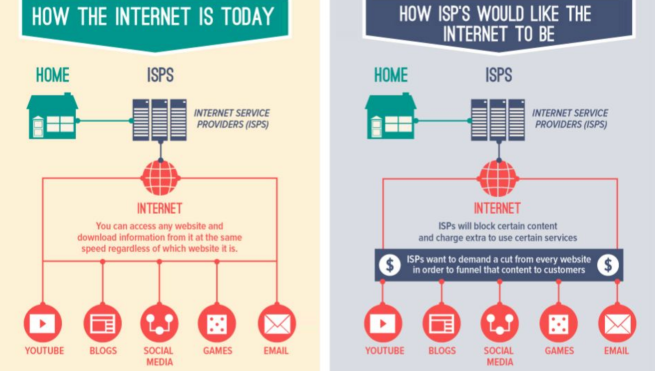Recently, FCC in the USA voted on repealing net neutrality, Although I have an unhealthy obsession with American politics (I live in the UK), this will affect how the world experiences the internet. First of all, before we go further, what is net neutrality? Net neutrality is preventing an internet service provider from picking sites it wants to give a better connection to. Right now, the internet is a level playing field as every site gets the same speed by law. However, if net neutrality is completely repealed, internet service providers can give quicker speeds to sites that can pay them more. They can also choke sites they don’t like or block them. The 18-year-old would be jumping up and down proclaiming that this is unfair, the adult me is a bit more split. To be honest, I’m still working out if this is a good or bad thing. Here are the pros and cons:
Against
The obvious con is the uneven playing field. Big companies will be able to have an edge without having a better product because they will be able to pay for faster connections. We’d also be naive to think that service providers will not strike deals with certain companies and take bribes. If one service provider has a financial interest in Amazon, they can give Amazon top speeds and choke/block their competitors. Also, free speech is under threat. Websites that say or advocate things that the service provider doesn’t like can be choked/blocked by the service provider, and the tie between internet service providers and politics will tighten. Startups are also in a tough spot if they are challenging an existing market.

For
On the flipside, there are people laughing and telling others that the internet was just fine before 2015. This is true, however, I’d argue that the political atmosphere that surrounds the internet has changed into a much nastier, dog eat dog beast as time has gone on. I’m a big fan of economics, and the internet is a finite resource. Including a variable in speed and payment. This is really good for distributing resources, for reasons why please read my post on the price hiking Uber did and how it improved resource distribution [link]. It also pushes startups and companies that do not have deep pockets to be more economical with data transfer and protocols. I’ve recently been experimenting with the service provider, Relish. It’s a satellite orientated, and unlimited, but it only works in London. As tech advances, we could see more service providers come out of the cracks with closed systems and more specialized packages. I know it’s cool and edgy to hate on closed systems but they do work for people who just want to use to service for a few simple tasks. Apple is a great example of this, and Google is now following building their own hardware to go with their software.

